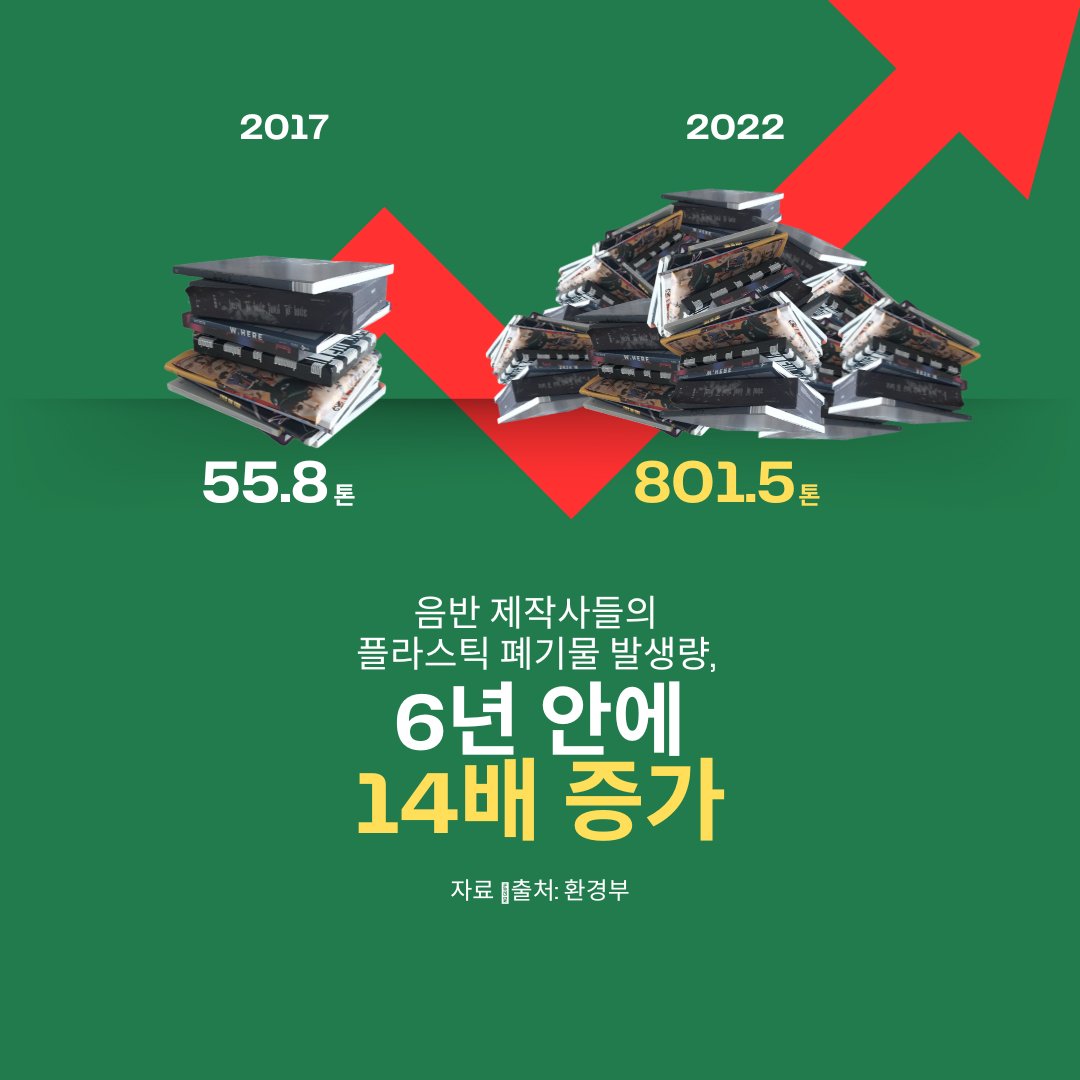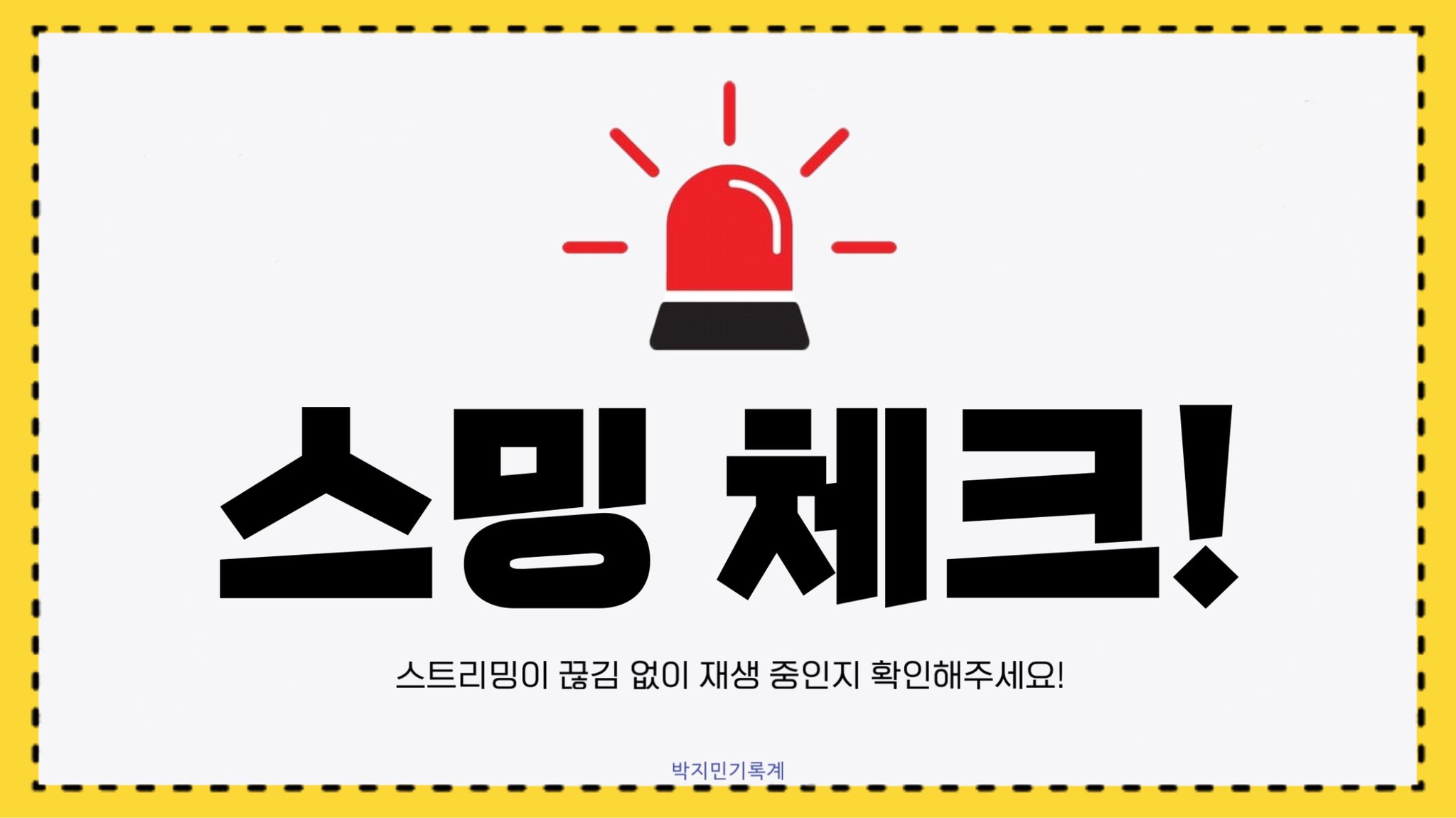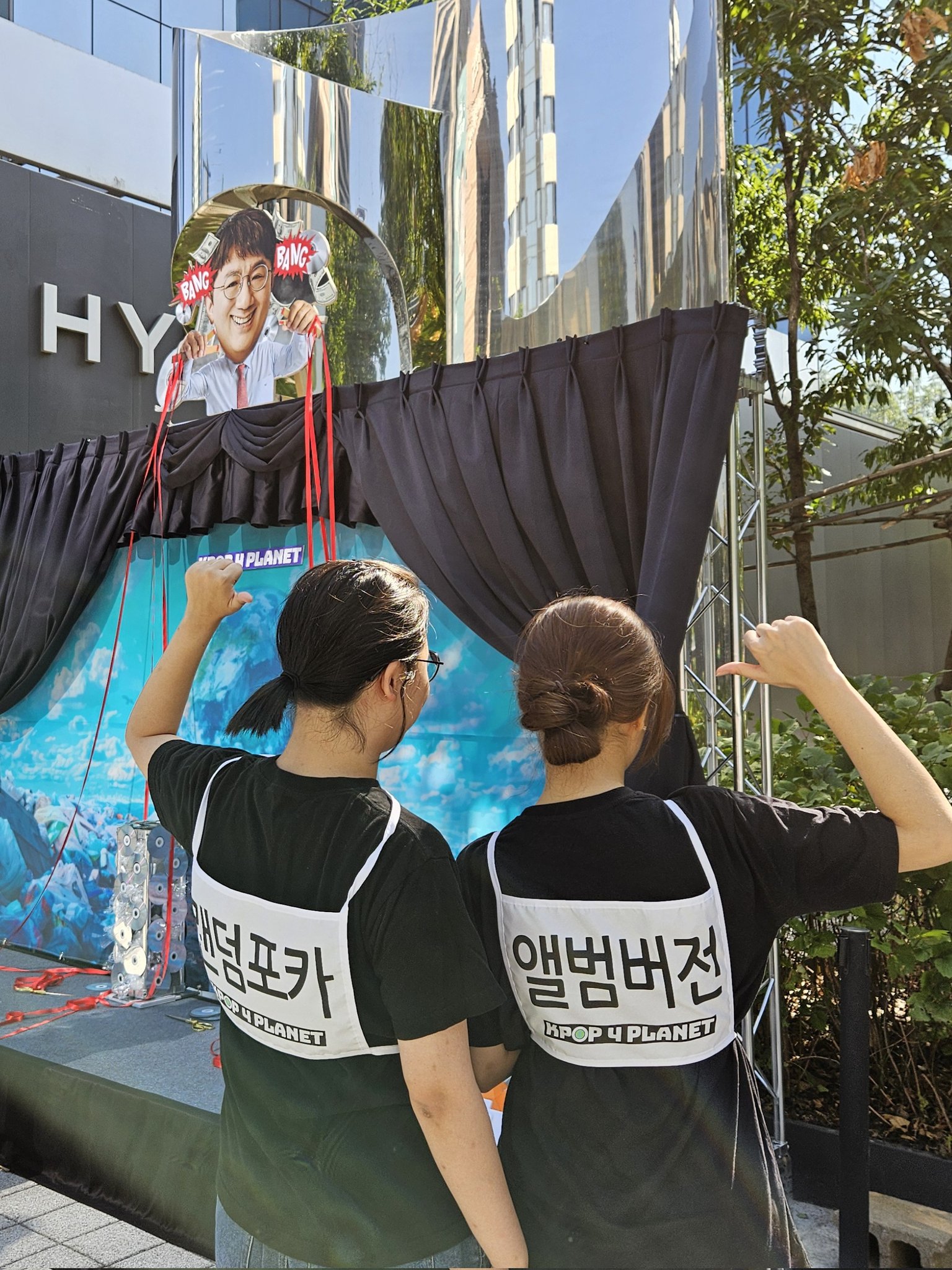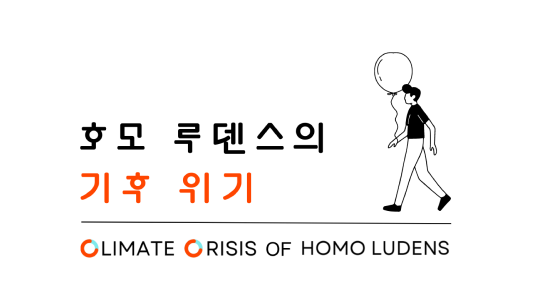Sustainable K-POP Powered by the Fandom
Popular culture—through music, movies, dramas, and performances—brings us great joy. However, while enjoying this popular culture, we sometimes end up buying things we don’t really need. We may have simply wanted to support our favorite artists or works, but before we realize it, we find ourselves purchasing unnecessary merchandise or limited-edition items that are very similar to things we already own. Anyone who loves popular culture has probably experienced this at least once. Modern society constantly pursues “more, newer, and cooler,” and as a result, popular culture is shifting its focus from fulfilling people’s hearts to emphasizing material things.
K-POP, which leads the Korean popular culture market, is not immune to these issues. For example, as the K-POP market has developed and changed, physical album sales have become an important criterion for evaluating an artist’s success. However, this has led agencies to produce excessive amounts of albums, fans to overconsume them, and then discard them—an issue that has long been a concern among K-POP fans. Moreover, as chart rankings on music streaming services have become a measure of a singer’s popularity and fandom loyalty, a so-called ‘streaming culture’ has emerged where fans keep music playing without actually listening. This trend has raised awareness about the electricity and energy consumption involved in streaming.
At the center of all these phenomena is the community of fans known as the ‘fandom.’ Driven by their love for artists, fandoms influence the K-POP market with strong purchasing power by buying albums, attending concerts, and purchasing merchandise. While in the past fans may have passively accepted the market’s encouragement of overconsumption, today’s fans are becoming smart and responsible citizens who actively take action. They protect the environment, demand that companies behave properly, and emphasize the importance of ethical consumption.
Especially since K-POP fandoms are mostly made up of young people, they have a distinct awareness of the climate crisis. At the center of this movement is ‘KPOP 4 PLANET.’ KPOP 4 PLANET is a very unique group, organized and run by fans—ordinary people—without interference from artists, agencies, or environmental organizations. This group focuses on the K-POP industry and carries out various campaigns.
This article examines the issue of carbon emissions generated by the global music market and the K-POP industry, explores efforts to reduce them in detail, and introduces one aspect of the sustainable K-POP future envisioned by KPOP 4 PLANET—a future that fans will lead and create.
Music and the Environment: The Story We’re Overlooking
Carbon Emissions in the Global Music Industry
Have you ever heard about the environmental impact of the pop music industry? In 2007, the greenhouse gas emissions from the music industry reached as much as 540,000 tons. Of this, 130,000 tons came from the production and distribution of albums and digital music, while 420,000 tons were generated by live performances such as concerts. This highlights that live performances are the biggest source of environmental burden in the music industry. However, this data is from 15 years ago, and considering the growth of the music market and the carbon emissions caused by streaming services today, the current amount is expected to be much higher.
It might be surprising to learn that music streaming also impacts the environment. Thanks to technological advances, we can now conveniently listen to music anytime and anywhere using our smartphones, but this convenience requires a huge amount of energy. The music files stored in streaming data centers travel through networks and routers before reaching our smartphones and ears, and every step in this process consumes a tremendous amount of electricity. This electricity usage ultimately leads to carbon emissions. For example, Olivia Rodrigo’s biggest hit, “Drivers License,” has been streamed since January 2021, releasing more carbon than taking 4,000 round-trip flights between London and New York. This amount is even greater than the carbon emissions produced by 500 people in the UK over an entire year, which is quite a surprising figure.
What about live performances like concerts? They remain the largest source of carbon emissions within the music industry. According to a 2019 study, live concerts held in the UK alone emit approximately 405,000 tons of greenhouse gases annually. When these live shows turn into nationwide or worldwide tours, the travel of artists, staff, and audiences becomes the main cause of carbon emissions. For example, during her Eras Tour in 2023, Taylor Swift used two private jets, flying a total of 166 hours over six months, releasing a significant amount of carbon. On top of that, lighting, sound equipment, and stage sets only add to the environmental burden. Additionally, waste like leftover banners and concert merchandise contributes heavily to environmental pollution.
Music and concerts bring us endless joy and inspiration. However, the fact that they also place a significant burden on the environment makes it difficult for us to enjoy music without concern. Are there truly no people making efforts to reduce this environmental pollution and carbon emissions?
The Pop Industry’s endless Challenge to save the Planet through Music
Carbon Reduction Efforts in the Global Music Industry
As the impacts of the climate crisis have reached an undeniable level, various members of the global pop music industry have become increasingly aware of carbon emissions and are actively working to reduce them. Spotify, the world’s largest music streaming service, has joined the United Nations Framework Convention on Climate Change’s carbon neutrality campaign, “Race to Zero,” aiming to minimize the environmental impact of streaming. Spotify transparently publishes its carbon emissions data annually. According to a 2022 report, between 2019 and 2020, Spotify reduced greenhouse gas emissions per employee and user by about 25% and migrated its streaming data centers to Google Cloud Platform, which runs on renewable energy. Spotify’s ultimate goal, as part of the Race to Zero campaign, is to achieve net-zero carbon emissions within the next decade. Similarly, Apple Music has committed to powering 100% of the energy used for streaming with renewable sources, joining the movement toward sustainability.
The Glastonbury Festival in the UK, one of the world’s largest rock festivals with over 200,000 attendees annually, has gained attention as a leading example of a music festival running without fossil fuels. By combining renewable electricity generated from solar power with generators fueled by used cooking oil, the festival was successfully held and sent a powerful message to the pop music industry: “Eco-friendly festivals can be just as amazing!”
Artists are also taking the lead in environmental protection efforts. Ed Sheeran, whose hit song “Shape of You” has been streamed over 2.6 billion times on Spotify, minimized air travel during his 2022 European tour, earning recognition as one of the most eco-friendly tours of the year. Compared to Dua Lipa’s tour during the same period, which emitted over 1,800 metric tons of carbon, Ed Sheeran’s tour produced less than 150 metric tons — a remarkable achievement. Coldplay went even further: during their 2021 tour, they reduced carbon emissions by 59%, planted 7 million trees — one per attendee — and saved 3,000 CO₂e by using sustainable aviation fuel. Additionally, they recycled or reused 72% of the waste generated during the tour, demonstrating what a truly sustainable tour looks like.

(Source: Coldplay Official Homepage)
Billie Eilish, an icon of Gen Z, is one of the most proactive pop artists addressing the climate crisis. In interviews, she emphasizes the importance of vegetarianism and has collaborated with the music industry carbon reduction NGO, REVERB, to establish the ‘Music Decarbonization Project.’ This project aims to reduce and ultimately eliminate the music industry’s reliance on fossil fuels. It has inspired over 35,000 fan-led climate actions and successfully supported carbon-neutral concerts by well-known artists such as Harry Styles and Maroon 5.
REVERB, the organization co-leading this project, is an NGO founded by Adam Gardner, the guitarist of the indie rock band, and his wife, environmental activist Lauren Sullivan. They work to bring about sustainable change throughout the music industry. Adam Gardner believes that artists and their fans can create significant change by joining forces. He emphasizes that “small actions add up to create huge change,” pointing out that simple behaviors like using reusable tumblers or carpooling to concerts can greatly reduce the carbon emissions generated by tours. Music has the power to connect people and drive change. Gardner states, “Hope and action are strongest when they come together.” The younger generation, the primary audience of popular culture and arts, believes that sustainable art is possible.
Is the Earth Hurting because of My Love?
Current Status of Carbon Emissions in the Domestic Music Industry
Meanwhile, in the domestic popular music industry, especially the K-POP sector, there are significant unnecessary carbon emissions caused by unique cultural characteristics in addition to the carbon emissions from tours and streaming seen in the overseas pop music industry. These cultural characteristics refer to various marketing tactics employed by entertainment agencies that foster a competitive atmosphere within the K-POP industry. Such tactics stimulate fans’ consumption behaviors, encouraging them to buy more albums than necessary, resulting in the overproduction and overconsumption of physical albums. A particularly problematic practice is adding fan event entry tickets or artist photocards to albums to boost sales. The more albums fans buy, the higher their chances of winning fan events, and photocards are produced in multiple versions and distributed randomly, so fans often need to purchase several copies to collect the ones they want. Albums excessively purchased this way are eventually discarded, creating a large amount of waste.

(Source: KPOP 4 PLANET’s X)
Entertainment agencies fiercely strive to increase album sales because of the ‘first-week sales’ chart. The first-week sales chart is a unique type of ranking chart in K-POP, where “first-week sales” refers to the number of albums sold during the first week after release. Originally, its purpose was to gauge how much an artist’s music was loved. However, recently, the first-week sales record has been distorted into a measure of an artist’s popularity and fandom loyalty. Fans competitively buy large quantities of albums to boost their favorite artist’s first-week sales, which has resulted in excessive increases in album sales—an effect known as ‘album inflation.’ Consequently, fans fall into a vicious cycle of overbuying albums every time their artist makes a comeback, trying to surpass previous first-week sales records.
This excessive overproduction and overconsumption of albums is causing serious environmental problems. Most K-POP albums consist not only of a CD containing the music but also various components such as lyric books, photo books, and photo cards. As a result, each album generates a large amount of waste that is difficult to recycle, including plastic, packaging materials, coated paper, and dyed paper. According to a survey by the Korea Creative Content Agency, only 12.7% of fans actually use the albums for listening to music. This means that most albums are used only to participate in events and are eventually discarded.
According to data from South Korea’s Ministry of Environment in 2022, domestic entertainment agencies used a total of 801.5 tons of plastic annually for album production. This marks a more than 14-fold increase compared to 55.8 tons in 2017. In fact, according to the 2022 Sustainability Report by HYBE, one of the major entertainment companies in South Korea, the amount of plastic used solely for the production and packaging of HYBE artists’ merchandise reached 894.6 tons in that year alone. This clearly illustrates the significant environmental impact of the album-centric culture in the K-pop industry.
The environmentally damaging marketing strategies of the K-pop industry do not end there. Another major indicator of a singer’s popularity and an entertainment agency’s success is the real-time music chart. These charts rank songs based on real-time streaming data from music platforms, and a song’s success is often judged by how high it climbs on these charts. Fans, driven by deep affection and loyalty toward their favorite artists, engage in repeated streaming—or even leave the music playing on mute without listening—just to boost chart rankings. This practice, known as “streaming manipulation” or “sseuming” (short for “streaming” in Korean fandom slang), is considered an essential duty among fans. However, as previously mentioned, streaming also emits significant carbon emissions, comparable to those from physical album production. Making matters worse, South Korea’s largest streaming platform, Melon, relies on data centers powered by fossil fuels. As a result, this streaming culture poses an even greater threat to the environment.

(Source: BTS Jimins’s Fan X, ‘박지민기록계’)
In this way, the various competitive marketing tactics of the K-pop industry go beyond being mere cultural phenomena and are now contributing to serious environmental issues. Fans, in their efforts to support their favorite artists, are increasingly burdened with a sense of climate guilt that inevitably accompanies their actions. It is now time to open a conversation about creating a more sustainable future for K-pop.
K-pop’s Green Transformation — and Yet…
arbon Reduction Efforts in the Korean Music Industry
Thanks to fans’ continued criticism and growing policy changes, entertainment agencies have recently begun making efforts to reduce waste and environmental issues caused by physical albums. For instance, artists under HYBE, including NewJeans who debuted in 2022, have adopted a new approach: instead of traditional plastic CDs, they include QR codes in their albums that allow fans to access the music digitally. This method reduces the number of discarded CDs while still focusing on components that fans value—such as photocards and raffle tickets. It represents a new attempt to simplify the conventional plastic album production process and to shift the focus toward what consumers truly want.
SM Entertainment, in collaboration with its artist NCT 127, introduced a new form of album. Whereas traditional albums typically come in booklet-style formats made of plastic or paper, this new version takes the shape of a keyring—an item that has become especially popular among the MZ (Millennial and Gen Z) generation. The keyring is not only practical for fans to keep and use, but it also contains an embedded NFC CD that allows digital access to the music. This approach helps reduce unnecessary waste from conventional albums and repositions the album as a unique collectible that can be cherished over time, rather than just a disposable product.

(Source: Marketing Research Institute Somaco’s Naver Blog)

(Source: Yes 24)
YG Entertainment produced the second full-length album BORN PINK by their flagship K-pop girl group BLACKPINK as an eco-friendly album. The album was released in three formats: a box set, a kit, and an LP. It utilized FSC-certified paper, low-carbon eco-friendly paper, soy-based ink, and environmentally friendly coatings. The kit version featured biodegradable PLA plastic, and the packaging incorporated eco-friendly vinyl made from corn starch. These measures reflect efforts to minimize environmental impact while still satisfying fans’ desire to collect physical albums.
Solo artist Chungha also released her full-length album <Querencia> in 2021 using eco-friendly materials. Similarly, FNC Entertainment’s boy group SF9 produced 80% of the printed materials for their mini album <<THE WAVE OF9>> with environmentally conscious materials such as FSC-certified paper, soy-based ink, and water-based coatings. These examples demonstrate an expansion of environmentally mindful production practices beyond just the album itself. Thanks to the active demands from KPOP 4 PLANET, Melon has also committed to transitioning 100% of its streaming data to a carbon-neutral cloud by 2030.
Various environmentally conscious initiatives are gradually increasing within the K-pop industry. However, these efforts are often inconsistent, event-driven, and primarily focused on eco-friendly album production, which presents a clear limitation. It is now necessary to expand sustainability efforts to broader areas, such as the operational practices of entertainment agencies and large-scale fan activities. There is a pressing need for new approaches to improve the unsustainable competitive culture in K-pop and to foster environmental awareness that aligns with global standards—keeping pace with K-pop’s remarkable global growth.
My Love Beats the Climate Crisis!
Fandom-Led Climate Action
As mentioned at the beginning, recent K-pop fandoms have evolved beyond being mere fans to become crucial players in the industry. Whereas fandoms were once considered just a small part of popular culture, they have transformed into powerful cultural communities with immense social influence, thanks largely to the rise of the internet and social media. Today, fandoms are indispensable core consumers in the K-pop market, and fans remain tightly connected through their own communities where information is shared rapidly and support is unwavering.
Fandoms are also proactive consumers who enthusiastically support their favorite artists. Motivated by genuine love for the artist’s brand value, fans willingly purchase merchandise and services, expressing their support and encouragement through these actions. Beyond simple consumption, fandoms often take on the role of “prosumers,” creatively reinterpreting and adding new value in their own unique ways. For example, K-pop fans have long engaged in various charitable activities in the name of their favorite idols. These efforts include tree planting and forest restoration, helping endangered animals, and supporting projects that build wells and schools. Such activities remain vibrant today. Especially among younger generations, who are highly sensitive to climate issues, fandom-led initiatives have evolved from one-off events into broader movements focused on the sustainability of the entire music industry. Representative examples include Planet Reimagined, a climate crisis initiative co-founded by Adam Met of the American indie pop band AJR and human rights activist Mila Rosenthal, as well as KPOP 4 PLANET, co-founded by K-pop fans Lee Dayeon and Nurul Saripah.
One of Planet Reimagined’s key initiatives is the Amplify project. This project aims to raise awareness about climate issues and encourage concrete action by engaging fans of various artists. Through Amplify, Planet Reimagined partnered with Ticketmaster (a ticket sales platform), iHeartRadio (a U.S. radio and streaming service), and REVERB (previously introduced) to conduct surveys involving thousands of music fans across the United States. This research helped reveal how fans perceive climate change and what steps they are taking to address it.
According to the study, 73% of fans who attended concerts of their favorite artists believed that “climate change is real and more action is needed.” Additionally, 78% of fans reported that they are already taking some form of climate action in their daily lives. Among all respondents, 53% felt that artists should speak out about climate change, and 40% said they are more inspired by artists who do so. Notably, 72% of fans considered climate change to be either “very important” or “somewhat important.” This research was significant in confirming that artist fandoms have a strong interest in addressing the climate crisis.
Building on this data, the Amplify project actively encouraged fans to engage with environmental policies in the regions where AJR’s 2024 nationwide tour stops were held. As a result, fans participated in over 35,000 environmental actions, including petition signing and sending messages to local politicians. For example, fans in Salt Lake City sent letters and postcards to Utah state legislators urging them to protect the water resources of the Great Salt Lake, while fans in Arizona wrote a letter to the Phoenix City Council requesting that extreme heat be declared a climate emergency. Through such region-specific environmental projects encouraged by AJR, fans gained valuable opportunities to actively contribute to addressing climate issues in their own communities. Planet Reimagined’s initiative demonstrated that artist fandoms show greater concern for climate issues than the general public and proved that active fan participation can successfully drive climate action.
The Amplify project aligns with the KPOP 4 PLANET campaign in that both involve fans actively participating in climate action. However, KPOP 4 PLANET is uniquely characterized by being a fully voluntary initiative driven entirely by fans themselves—without the support of artists, environmental experts, or corporations.
KPOP 4 PLANET: The Way Passionate Fans(Ppasooni) are Changing the World
Characteristics of K-pop Fandom and the Past, Present, and Future of KPOP 4 PLANET
First, let’s take a closer look at the fandom—the very force that created and nurtured KPOP 4 PLANET. What exactly is a fandom? What drives these agents of change? A fandom is a community of fans who share a deep admiration for the same artist. It is a group characterized by a strong sense of belonging, close bonds, proactive engagement, and powerful collective influence. While a fandom is not an organization with a formal structure or central leadership, its members unite around one shared goal: to support their artist. They do this by purchasing albums, streaming music, donating, and organizing various charitable campaigns. Research shows that fandom members see themselves as part of a positive, supportive group and experience strong connections with fellow fans. This sense of belonging becomes an important part of their individual identity.
These fandoms consist of young people who are deeply interested not only in supporting their artists but also in progressive issues, including environmental concerns. As previously mentioned, research has shown that American artist fandoms demonstrate a high level of awareness and commitment to addressing the climate crisis. Similarly, K-pop fans exhibit an equally strong consciousness about climate issues. According to a survey conducted jointly by Hankyung Environmental News and KPOP 4 PLANET, 82.7% of participating K-pop fans said they would stop purchasing K-pop products if those products were found to harm the environment. Furthermore, 96% believed that the K-pop industry should cultivate a culture that takes the climate crisis seriously, and fans specifically held entertainment agencies most responsible for environmental pollution, with 95.6% attributing the greatest responsibility to them.
Reflecting these fans’ voices, KPOP 4 PLANET has carried out various campaigns aimed at creating direct change within the K-pop and music industry, including a campaign for decarbonizing streaming platform data centers, a call for carbon-neutral concerts, and a protest against excessive album consumption tactics. KPOP 4 PLANET was launched in March 2021 and began its activities in April of the same year with the TOKOPEDIA4BUMI campaign, which urged Tokopedia—the largest e-commerce company in Southeast Asia that had appointed a famous K-pop idol as its brand ambassador—to switch to renewable energy by 2030. The campaign garnered 2,083 signatures and included a peaceful protest in front of Tokopedia’s headquarters as well as meetings with internal teams of the company, making it a large-scale effort. However, this first campaign ended without achieving clear results.
The second campaign took place in September of the same year and was called “SAVE THE BUTTER BEACH.” It aimed to protect Maengbang Beach in Samcheok, Gangwon Province—the filming location of BTS’s hit song “Butter” music video—from destruction caused by the construction of a coal-fired power plant. Maengbang Beach had rapidly become a sacred site for fans both in Korea and abroad, attracting significant attention. However, environmental changes began to occur due to the coal transportation port construction related to the Samcheok coal power plant nearby, which affected the natural movement of sand on Maengbang Beach. KPOP 4 PLANET collaborated with the domestic environmental group Beyond Coal to stop this environmental damage and advocate for the reduction of coal-fired power generation. They conducted an online petition targeting BTS’s fandom, ARMY, as well as the general public, and ran full-page advertisements in the media, engaging in active campaign efforts.
While these early campaigns were connected to K-pop, they had limited direct impact on the broader popular culture and entertainment industry. Therefore, KPOP 4 PLANET planned their next campaign to urge K-pop artists to hold carbon-neutral concerts, similar to those organized by Coldplay and Billie Eilish. This campaign was called “KPOP ZERO EMISSION CONCERT.” The main demands included banning single-use plastics during concerts, using eco-friendly buses and vehicles for artist and fan transportation, and donating concert profits toward carbon reduction efforts. Through a unique event where participants could reserve virtual carbon-neutral concert tickets, 4,977 people joined the campaign. This campaign also achieved notable outcomes such as hosting a sustainability roundtable discussion on the K-entertainment industry with the Korea Entertainment Producers Association, Naver ESG, and Kakao Entertainment.

(Source: KPOP 4 PLANET’s X)
KPOP 4 PLANET didn’t stop there. In 2022, they launched the “No K-POP on a Dead Planet” campaign, which called on entertainment agencies to reform their album marketing tactics. This campaign became one of the most widely recognized among the public, demanding eco-friendly options that reduce waste when purchasing artists’ albums, minimizing plastic packaging for albums and merchandise, expanding digital album releases, and actively raising awareness and taking action on the climate crisis together with artists. As part of this campaign, fans collected unwanted albums and delivered them to various entertainment agencies, held dance performances in front of HYBE’s headquarters, and engaged in other proactive actions, culminating in an impressive 10,000-signature petition. As a result, major entertainment agencies began publishing ESG reports and made changes such as producing albums with eco-friendly materials and reducing plastic use. This campaign laid the foundation for KPOP 4 PLANET’s current flagship campaign, “The Sin of Plastic Albums.”
While the “No K-POP on a Dead Planet” campaign brought a wave of sustainability awareness to the Korean music industry, most of its impact remained passive or limited to one-off events. Recognizing the need for more fundamental and systemic change, KPOP 4 PLANET launched the “The Sin of Plastic Albums” campaign in 2024. This campaign calls on entertainment agencies to completely stop marketing tactics that encourage duplicate album purchases—such as random photocards and fan sign event entry tickets—and demands transparent disclosure of greenhouse gas emissions and waste generated from album production. Through this campaign, KPOP 4 PLANET sent an open letter urging HYBE, the industry leader, to end exploitative album marketing practices and held a performance in front of HYBE’s headquarters to protest against harmful album marketing. As of now, the campaign has gathered 10,925 signatures, and if successful, it is expected to bring significant change to the domestic music industry.

(Source: KPOP 4 PLANET’s X)
In addition, KPOP 4 PLANET launched a campaign targeting Melon, South Korea’s largest streaming platform and the key chart provider of the ‘Real-time TOP 100’—an important indicator of K-POP idol popularity. As the streaming culture (“streaming wars”) among K-POP fandoms intensified, Melon expanded its servers to keep up. The problem was that Melon’s servers and data centers relied on electricity generated from fossil fuel power plants. In 2022, KPOP 4 PLANET condemned this practice and launched the “Melon Tastes Carbon” campaign, demanding that Melon switch to renewable energy sources. As a result, Melon pledged to achieve carbon neutrality for its streaming data centers by 2030.
Beyond campaigns directly related to the music industry, KPOP 4 PLANET also leverages the powerful influence of K-POP artists who are active across various fields. For example, luxury brands have increasingly appointed K-POP idols as their ambassadors to target the growing purchasing power of the MZ generation and the Asian market. As a result, which brand an artist represents has become one of the biggest interests for fans. Capitalizing on this fan influence, KPOP 4 PLANET launched the “Luxury Unboxing: Greenwashing Edition” campaign, demanding that luxury brands fully transition to 100% renewable energy and disclose their energy usage. Additionally, KPOP 4 PLANET ran the “Hyundai, Stop Coal!” campaign condemning Hyundai Motor Company—who uses BTS as a model to build an eco-friendly image—for signing a purchase agreement to supply aluminum to a coal-fired power plant in Indonesia. Thanks to this pressure, the MOU was ultimately halted.
In addition, inspired by the fact that idol fandoms have consistently created forests and engaged in donation activities in the names of their favorite artists, KPOP 4 PLANET launched the ongoing ‘FANDOM 4 FOREST’ campaign. This initiative aims to widely promote and encourage the positive actions of K-POP fans by creating a map of K-POP fandom forests and carrying out forest adoption projects.
Closing Remarks: The Challenges and Vision of KPOP 4 PLANET
Lee Dayeon, the founding campaigner of KPOP 4 PLANET who remains actively involved, emphasized that for KPOP 4 PLANET to be sustainable, its main campaign target should continue to be K-POP fans. However, she also highlighted the need to expand its reach by leveraging one of K-POP’s biggest characteristics—its vastness and blurred boundaries—to engage a wider range of people. She stressed that K-POP is no longer just a Korean phenomenon but a global cultural force with immense influence. To enjoy and develop this culture for the long term, K-POP must take responsibility and drive change that positively impacts both Korea and the world. For this to happen, she added, it’s essential that not only fans but also artists and entertainment agencies act together.
The current environmental issues in the K-POP industry, especially phenomena like excessive album consumption, have led to criticism aimed at fans who purchase anything bearing their favorite artist’s name. However, activist Lee Dayeon and many researchers argue that fans should not be blamed. As long as the industry’s fundamental system encourages mass purchases, it is unfair to outright condemn fans for consuming in ways driven by their desire to meet idols or collect photo cards of specific members. Fans are simply making the choices that bring them the greatest satisfaction within the options available to them.
Rather than blaming fans, it is more reasonable to criticize the short-sighted mentality of entertainment agencies that continually produce products without considering fans’ needs, market sustainability, or environmental impact—simply converting fans’ love and purchasing power into monetary value. As long as album inflation continues, K-POP albums are likely to be produced in greater quantities every year, leading to more waste and discarded albums. To ensure market sustainability, agencies must separate albums from fan meetings and photo cards. Photo cards should be sold like regular merchandise rather than being randomized, and fan meeting entry tickets should be available for digital purchase. Although removing the randomness strategy might reduce album sales, the revenue from selling photo cards and digital fan meeting tickets is likely to offset that loss. Furthermore, the industry needs to move away from its obsession with numbers like “1 million copies sold” or “#1 on album charts” and escape the competitive atmosphere.
Activist Lee Dayeon emphasizes that as K-POP continues to expand globally, it must evolve with environmental responsibility to sustain and develop further. She believes that to drive this change, fans, artists, and entertainment agencies need to collaborate closely. When asked about KPOP 4 PLANET’s next steps, Lee said they plan to focus on the ongoing ‘Sin of Plastic Albums’ campaign, which condemns the sales tactics of entertainment agencies, demands transparency in album-related waste and greenhouse gas emissions, and calls for concrete reduction plans. While previous campaigns have led many agencies to publish ESG reports and produce albums with eco-friendly materials, Lee expressed regret that fundamental solutions—such as halting manipulative album sales tactics that fans want—have yet to be achieved. She also noted that as K-POP’s global influence grows, some pop stars abroad have started mimicking these harmful sales practices. Therefore, if the ‘Sin of Plastic Albums’ campaign succeeds, it could trigger significant change not only in the Korean music industry but also across the global record industry.

(Source: Instiz Article)
Activist Lee Dayeon’s ultimate goal is to harness K-POP fans’ strong passion and concern for environmental issues to drive campaigns and create change beyond just the K-POP scene. In the process, she hopes to break down the negative stereotypes associated with the derogatory term ‘Ppasooni’ (a slang word used to belittle idol fans) and reshape the image of these fans as socially conscious and actively engaged young people committed to public causes. Achieving this would be an ideal outcome.
K-POP has long captivated the public with its unique competitive glamour, becoming an object of admiration. However, this enjoyment has come at the expense of both the members of the K-POP scene and the environment. If K-POP can evolve to become a culture that heals rather than harms the Earth—working alongside KPOP 4 PLANET—and if we all commit to small actions for a sustainable future, that collective power will bring about remarkable change. The potential shown by KPOP 4 PLANET marks the starting point. Their challenge will continue, and with passionate fans by their side, the dream of a ‘sustainable K-POP’ can surely become a reality.
Resources
- 그린비즈 (2024.09.11). 록밴드도 기후변화 막는 데 동참…저탄소 라이브 콘서트.
- 네이버블로그 ‘마케팅연구소, 소마코’ (2022.12.19.) 뉴진스, 제이홉 CD앨범에는 CD가 없다고요?
- 세계일보 (2024.10.09.) K팝 앨범 플라스틱’ 증가세…하이브, 전체 사용량 75% 차지 [국감 현장].
- 연합뉴스 (2023.10.22.) ‘하이브만 연간 900t’…최근 6년간 ‘K팝 플라스틱’ 14배로 늘어.
- 예스 24. 엔시티 위시 (NCT WISH) – 미니앨범 1집 : Steady Keyring Ver.
- 오마이뉴스 (2023.06.13.) 케이팝, 팬덤 경고 무시하다간 먼저 죽을 수 있다. 환경 문제 야기하는 케이팝 음반산업 “죽은 지구에 케이팝은 없다”.
- 우은경 & 김성준 (2023) 케이팝 산업에서의 지속가능 디자인 서비스 사례 연구. 조형미디어학, Vol. 26, No. 3, pp. 189-197.
- 인스티즈 (2024.05.24.) 팬들한테 욕 먹고 있다는 테일러 스위프트 앨범 상술.
- 정세영 (2022) 친환경 음반에 대한 K-Pop 팬덤의 인식도 및 구매행동 연구. 경기대학교 한류문화 대학원 석사학위 논문.
- 케이팝포플래닛 공식 홈페이지.
- 케이팝포플래닛 공식 X.
- 코리아타임스 (2021.03.04.) Global K-pop fans unite forces at KPOP 4 PLANET for climate action.
- 환경일보 (2022.10.28.) 과소비에 빠진 K-Pop 문화‧‧‧ 팬과 지구만 ‘신음’.
- Apple News (2018.04.10.) Apple, 이제 전 세계에서 100% 재생 가능 에너지로 가동.
- BBC (2024.06.03.) Coldplay say they have beaten eco-touring targets.
- Battagello, L. (2024.12.08.) Eras Tour has huge carbon footprint. What’s a green Taylor Swift fan to do?
- BTS 지민팬 X 계정. https://x.com/traceofjimin/status/1540957558114254848
- ColdPlay 공식 홈페이지
- GRAMMY. (n.d.) The Environmental Impact Of Touring: How Scientists, Musicians & Nonprofits Are Trying To Shrink Concerts’ Carbon Footprint.
- Jones, C., McLachlan, C. & Mander, S. (2021) Super-Low Carbon Live Music: A roadmap for the UK live music sector to play its part in tackling the climate crisis. Version 5.1. Tyndall Centre for Climate Change Research, University of Manchester.
- King, K. (2022.06.19.) Limitations on K-Pop’s Commitment to Sustainability. Korea Economic Institute, The Peninsula.
- Leksmono, D. L. D. & Maharani, T. P. (2023) K-Pop Fans, Climate Activism, and Participatory Culture in the New Media Era. UNITAS, Vol. 95, No. 3, pp. 114–135.
- Liew, S., Hø, J. & Aase, I. (2023) BTS As Global Ambassadors For Sustainable Development: Does A Strong Fan-Artist Relationship Secure Engagement With Sustainability-Oriented Activities? Korea Business Review, 신년 특별호, pp. 1-22.
- Planet Reimagined (n.d.) AMPLIFY: Building a Fan-Based Climate Movement.
- Reverb (n.d.) Music Climate Revolution: Music Decarbonization Project.
Suggested Reading










